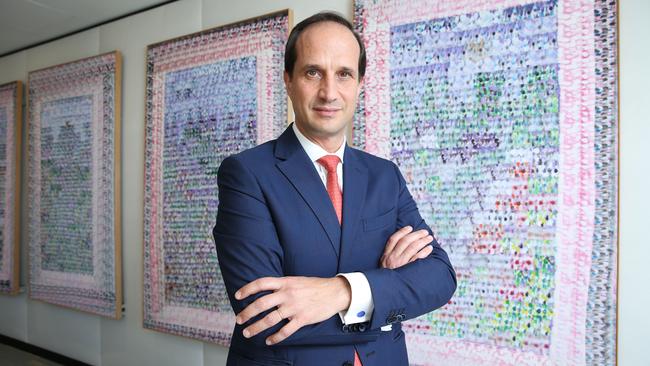AMP to update investors on potential sale by year’s end
AMP’s beleaguered board wants to provide a shareholder update on the potential sale of all or parts of the 171-year-old wealth group.

AMP’s beleaguered board wants to provide a shareholder update on the potential sale of all or parts of the 171-year-old wealth group before the year’s end, as several investors ramp up pressure for a break-up of the company.
The Australian understands key decisions about how AMP will proceed on a potential sale of its real estate platform are likely in coming weeks, while an investor update on the broader strategic review is pencilled in for before Christmas.
An spokesman wouldn’t comment on the company’s timeline on Sunday. In early September, after receiving an increase in inbound interest, AMP’s Debra Hazelton-led board announced the sweeping portfolio review to “assess all options to maximise shareholder value”.
Sources said the AMP board had since formed a portfolio review committee which was meeting about once a week to discuss developments in the process.
The review will take some time given AMP’s Australia division — which includes the bank, investment platform and financial advisers — is interconnected with AMP Capital, the real estate, infrastructure and equities unit. A formal auction with dates for bids to be lobbed for any of AMP’s businesses is yet to get under way despite a flurry of interest.
Sources said that would only occur if there was real and compelling bid interest, noting the board did not have a preference for a whole-of-company takeover offer over bids for parts of the business.
Private equity giants including Blackstone and KKR are staying close to the process, as are potential strategic buyers that want a seat at the table if there is an AMP carve-up.
This year has been torrid for AMP. Scandals have left its Australia and capital divisions without permanent executives to run them. AMP’s shares have declined 20.9 per cent this year, giving the company a market value of $4.86bn.
Former AMP chairman David Murray and director John Fraser exited the board in August after investor fury over the promotion of Boe Pahari to run AMP Capital, even though he had been financially penalised for a 2017 sexual harassment complaint.
Earlier that month, AMP Australia boss Alex Wade resigned over conduct issues, including sending lewd photos to a female employee.

AMP’s chief executive Francesco De Ferrari is working through a three-year turnaround plan after selling the life insurance division to Resolution Life.
Goldman Sachs and Credit Suisse are spearheading the portfolio review alongside law firm King & Wood Mallesons.
AMP’s real estate platform is already generating a lot of bidder interest from the likes of Lendlease, Charter Hall and Dexus Property.
Dexus has put forward an offer to merge the Dexus Wholesale Property Fund with the AMP Capital Diversified Property Fund.
Investors want AMP’s board to make decisive calls to maximise value, and its second-largest shareholder, fund manager Allan Gray, sees a break-up of the group as the best solution if the target can attract a “good price”.
“There is so much value to be unlocked by breaking up and selling off the component parts,” Allan Gray portfolio manager Simon Mawhinney said.
“I don’t think AMP has a reason to exist in its current form. If this board doesn’t do that (break up) it is likely a would-be acquirer buys the whole company and does do that.
“The business needs to be put in a position where its components can grow and flourish.”
Fellow AMP investor Merlon Capital Partners wants clarity on the future of AMP Capital before the year’s end.
“We’ve been advocates of a further return of capital, above and beyond what they (AMP) have already announced, and a spin-off of private markets within AMP Capital,” Merlon’s Hamish Carlisle said.
“In the absence of a compelling (whole-of-company) transaction, it’s down to value and my view would be the greatest way to crystallise value is to spin off private markets and return capital … post those actions they can extract a full premium through a sale for what’s left.
“They need to provide clarity to staff and clients more so than shareholders. The intention should be to make (strategic) decisions before the end of the year.”
Australian Eagle Asset Management portfolio manager Alan Kwan, who is also an AMP shareholder, is taking a “wait and see” approach.
He said there were challenges to “disentangle the parts” of any AMP divisions it wanted to sell, and the company might forge ahead with its turnaround plan rather than selling off parts.
“The jury is still out on Mr De Ferrari, and he hasn’t necessarily had a clear run (to execute his strategy),” Mr Kwan added.







